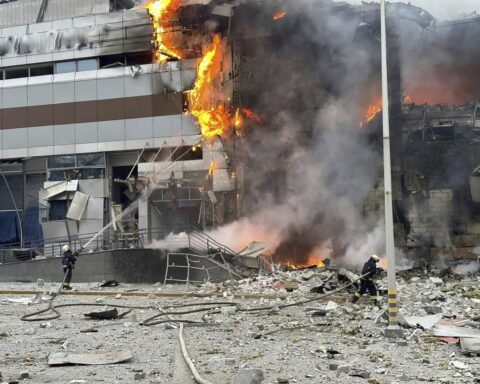The U.S. Senate is expected to vote on a long-delayed military-aid package that includes more than $60 billion for Ukraine as early as April 23 after the House of Representatives passed the measure on April 20 following months of bickering.
The package, which contains desperately needed aid for Ukraine’s embattled military, is anticipated to pass in the Senate as early as April 23 and be sent to U.S. President Joe Biden for signing by the end of the week.
Senate Majority Leader Chuck Schumer (Democrat-New York) asked fellow senators to pass the bill on April 23 “as expeditiously as possible.”
Schumer said the vote was “six months in the making” and urged his colleagues “not keep our friends around the world waiting for a moment longer,” Schumer said in a speech as the Senate opened.
Senate Minority Leader Mitch McConnell (Republican-Kentucky) said failing to support allies emboldened rivals like China and Russia, and denounced isolationism.
“Today, the Senate sits for a test on behalf of the entire nation. It’s a test of American resolve, our readiness, and our willingness to lead,” he said.
The Democratic-controlled Senate could pass the massive $95 billion package, which also contains military aid for Israel and Taiwan, as soon as April 23 in the afternoon if the timing for a vote is rapidly agreed.
If Republicans opposed to the bill attempt to procrastinate the process, a vote could be held on April 24.
The bill is expected to easily garner the 60 votes needed for approval.
Biden told Ukrainian President Volodymyr Zelenskiy in a phone call on April 22 that the United States will “quickly provide significant new security assistance packages to meet Ukraine’s urgent battlefield and air defense needs,” the White House said in a statement.
Ukraine has been under mounting Russian pressure over the past several months as its stocks of ammunition and air defenses gradually ran out.
An intense campaign of Russian missile and drone strikes on Ukrainian cities has taken a large toll in human lives and has caused huge damage to the country’s already battered energy infrastructure after more than two years of war.
Zelenskiy said on X, formerly Twitter, that Biden told him he will sign the bill “immediately as soon as it is approved by the Senate.”
Zelenskiy also told Biden about a strike on the TV tower in Kharkiv, Ukraine’s second-largest city, which had occurred just before their conversation.
Zelenskiy said later on April 22 that the Russian missile strike that smashed the prominent skyline tower was part of the Kremlin’s effort to intimidate the city, which in recent weeks has come under increasingly frequent attack.
The strike sought to “make the terror visible to the whole city and to try to limit Kharkiv’s connection and access to information,” Zelenskiy said.
Ukraine’s air defense shortages have made Kharkiv, a city with a population of more than 1 million located just 35 kilometers from the Russian border, more vulnerable to air and missile attacks. The power supply has already been disrupted and electricity is only available on an hourly basis.
“Russia clearly signals its intention to make the city uninhabitable,” Zelenskiy said in his post on X about his call with Biden.
In the latest strikes, Russian drones targeted Ukraine’s Black Sea port city of Odesa early on April 23, wounding nine people, including four children, of whom two are less than a year old, regional administration chief Oleh Kiper said, adding that several buildings caught fire.
Ukrainian air defenses shot down 15 out of 16 drones launched by Russia at the regions of Odesa, Kyiv, Mykolayiv, and Cherkasy, the air force said in a statement on Telegram.
All drones targeting Kyiv were destroyed, Serhiy Popko, the head of the Ukrainian capital’s military administration, said in a message on Telegram, adding that there were no casualties or damage in the city.


















